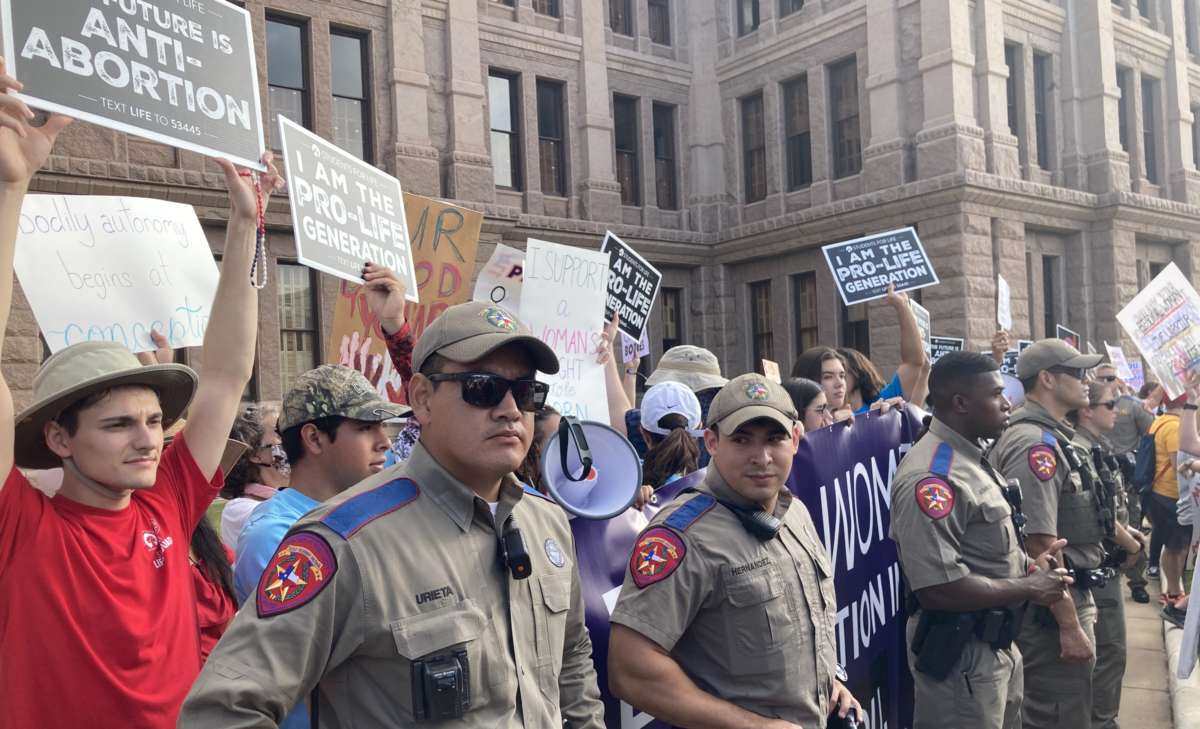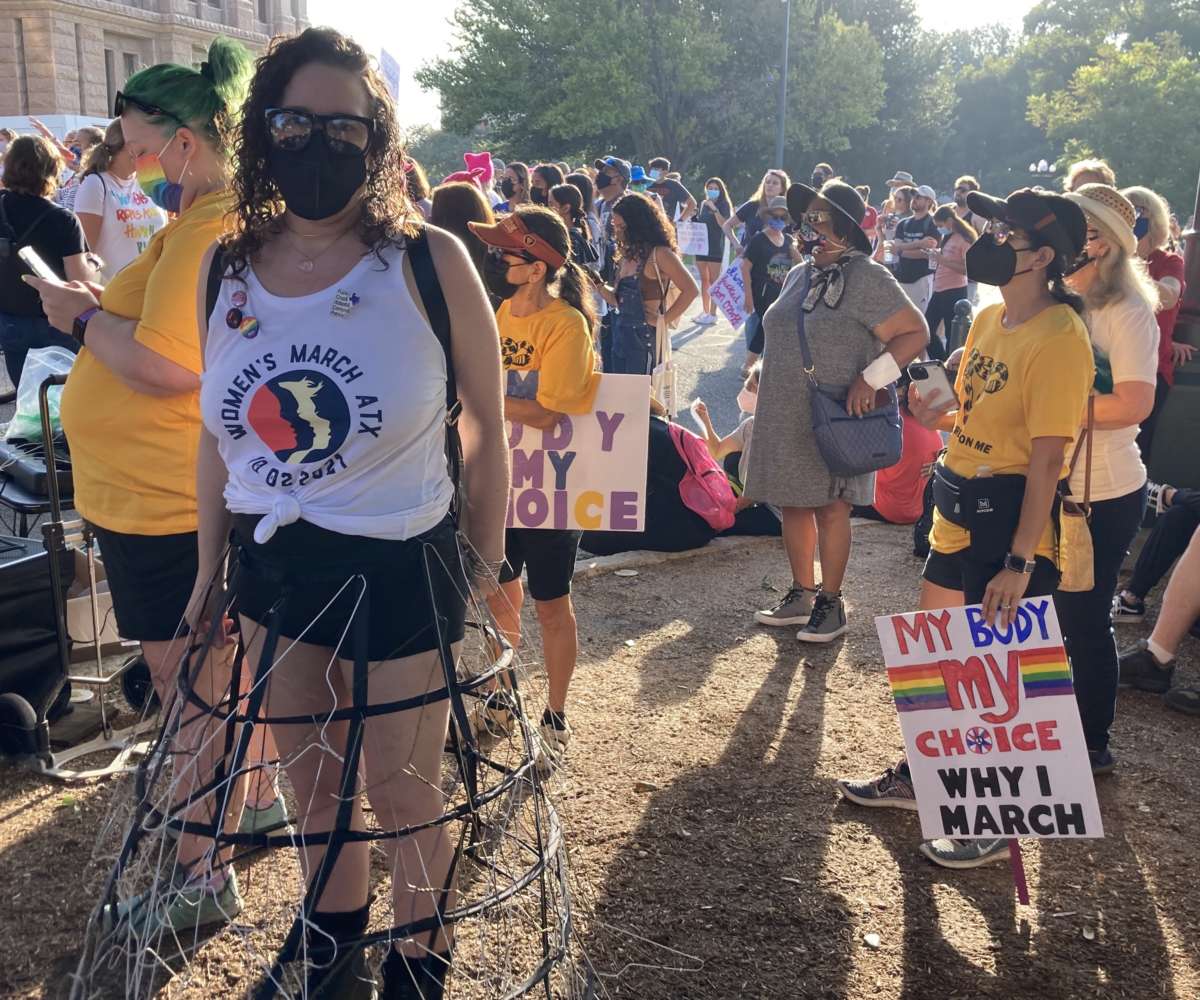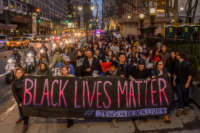
“Texas is playing by its own rules on immigration and deputizing police from as far away as Iowa to participate in Abbott’s state-level war on migrants. The implications here are just horrifying,” says Kelly Hayes. In this episode of “Movement Memos,” Kelly examines recent events in Del Rio, Texas, where Black asylum seekers were brutalized and faced mass deportations, and also highlights Operation Lone Star, Texas Gov. Greg Abbott’s unconstitutional, state-level war on migrants. Kelly also talks with Breanne Palmer, with the UndocuBlack Network, and Kevin Herrera, with Just Futures Law, about the fight to defend refugees and asylum seekers.
TRANSCRIPT
Note: This a rush transcript and has been lightly edited for clarity. Copy may not be in its final form.
Kelly Hayes: Welcome to “Movement Memos,” a Truthout podcast about things you should know if you want to change the world. I’m your host, writer and organizer, Kelly Hayes. On this show, we talk a lot about building the relationships and analysis we need to create movements that can win. Today, we are talking about immigration and deportations — a subject that many liberals and progressives were passionate about during the Trump administration, and a topic that a lot of people are noticeably avoiding these days. We are going to discuss what happened in Del Rio, Texas, where the U.S. government recently cleared an encampment of 15,000 largely Haitian refugees, and deported thousands of people within days, after images of Border Patrol violence went viral. We’re also going to talk about Governor Greg Abbott’s private, unconstitutional war on migrants: Operation Lone Star. That’s way too much for me to break down on my own, so we’ll be hearing from Breanne Palmer, from UndocuBlack Network, and attorney Kevin Herrera, who works with Just Futures Law, an immigration law project rooted in movement lawyering. We’ll also be talking about why a lot of people are less engaged with immigration justice under Biden, beyond the obvious red team, blue team divides, and why that needs to change.
Under Trump, we saw unmitigated outrage from Democrats and liberals about family separations, children in concentration camps, and Trump’s vile attitude toward migrants. The idea that refugees should be welcomed was a mainstream liberal idea, echoed by Vice President Kamala Harris, during her presidential campaign, when she tweeted in 2017, “Say it loud, say it clear, everyone is welcome here.” But following the ouster of Donald Trump, things changed.
Many self-described migrant justice advocates have tolerated or ignored the role of Democrats in the progression of border violence in the United States. This is a cyclical problem, and the cycle has to be broken. Because people’s lives and dignity are at stake. And I believe our humanity and our collective survival are at stake as well. Back in 1996, when I was still in high school, Bill Clinton signed the rarely discussed Illegal Immigration Reform and Immigrant Responsibility Act, only two years after signing his now infamous crime bill. The Illegal Immigration Reform and Responsibility Act closed avenues to documentation, and radically expanded the criteria for deportation. The mass deportation machine that has since been exploited by both Republican and Democratic administrations was, in many ways, enabled by this legislation.
When it comes to deportations, repelling migrants and refugees, and other massive investments in securitization, Republicans and Democrats may use different rhetoric, but their underlying objectives are similar, because securitization is the bipartisan response to virtually every disruption of the status quo. When it comes to intra-communal violence, the state’s solution is never to address the roots of harm and violence, but to strengthen its ability to surveil, contain and enact violence upon the populace. In the case of migration, solutions that involve debt forgiveness, ending austerity or harmful trade agreements, or addressing climate change, or actually welcoming refugees in the manner that candidate Harris described, are never on the table. When either party has power, it addresses migration by ramping up deportations and creating deadly or hopeless conditions that are meant to deter migrants from attempting to come to the United States.
Harsha Walia describes these dynamics in her book Border & Rule: Global Migration, Capitalism, and the Rise of Racist Nationalism, and I want to share a passage that I think illustrates how all of this has progressed. Walia wrote:
Faced with multiple crises beginning in the 1960s, including a deep recession, military defeat in Vietnam, and an enormous wave of social protests and strikes, the U.S. ruling class set out to restore U.S. capitalism and empire. They did so by adopting and exporting neoliberalism, rolling back social movement gains by normalizing carceral governance, and reimposing imperial supremacy beginning with genocidal wars in Central America and culminating in the global war on terror. Consequently, a growing number of people were displaced and then contained by the U.S. through its expanding border imperialist regimes across maritime space with Haiti and at the land border with Mexico. U.S. immigration policies were not only parallel to but a fulcrum between domestic and global warfare. Repressive border policies served as a thread braiding together social warfare, mass destabilization and displacement, capitalist extraction, and militarized carceral control, both at home and abroad.
Securitization is a bipartisan imperative, and it appears, our country’s only real response to climate change, and the reality that hundreds of millions of people will be displaced in the coming years. The bipartisan plan in the United States is to slam the door and let those people die, rather than addressing the root causes of migration or offering any form of safe harbor, and we have to reconcile that in order to have any meaningful conversations about immigration policy. So, I wanted to start there.
As many of you know, on September 20, videos emerged of Border Patrol agents on horseback, whipping migrants with split reins, while chasing and nearly trampling the asylum seekers. On September 22, the UndocuBlack Network, Haitian Bridge Alliance, United We Dream, the Movement for Black Lives, and 236 cosigning organizations sent an open letter to President Biden, Vice President Harris, Majority Leader Schumer, and Speaker Pelosi demanding an end to the use of Title 42, a public health measure that was first weaponized by Donald Trump to facilitate mass deportations. The letter also called for drastic budget cuts to the Department of Homeland Security, among other demands. Highlighting the role of colonial powers, like the United States, in creating Haiti’s current predicament, the coalition wrote:
Immigration is a Black issue. For decades, the world has witnessed unstable environmental and political conditions in Haiti act as consistent roadblocks to peace and liberation for the island nation and its people. We understand these conditions are the direct result of centuries of financial and political punishment from global colonial powers, as revenge for Haiti’s unapologetic seizing of its own freedom as the world’s first Black-led republic.
While the Biden administration has been apologetic about the spectacle of brutality, the administration has also been using Title 42 to deport thousands of Haitian refugees without allowing them to apply for asylum. According to the UndocuBlack Network, more than 6,000 Haitian migrants have been expelled back to Haiti under Title 42 without access to asylum protection, as required under U.S. and international law, since September 19. Many of the deportees left Haiti in 2010 after an earthquake that killed 200,000 people. They have now been returned to a country they haven’t seen in years, in the aftermath of another catastrophic earthquake and a presidential assassination — a country with a government on the brink of collapse, where street violence is rampant. I recently spoke with Breanne Palmer from the UndocuBlack Network, and she had a few thoughts she wanted to share with you all about Title 42.
Breanne Palmer: So my name is Breanne Palmer. I’m the interim policy and advocacy director at the UndocuBlack Network. The UndocuBlack Network is a multi-generational network of currently and formerly undocumented black people. We do policy work and advocacy work with the administration, with members of Congress, so we also have a very robust narrative and media team that seeks to complicate narratives about immigration and particularly about Black immigrants. And we also strive to provide community care and wellness resources for our members, so they’re not just living, but thriving and living very full, wonderful lives outside of the struggle for just immigration. And so, that’s a bit about me and about my organization.
The past few weeks, the photographs and videos that have been going viral of horseback CBP officers, brutalizing Haitian immigrants, and other Black immigrants who are being misclassified as Haitians, much of that is the fault of the Title 42 policy that is currently in place in the U.S.. And so Title 42 is … before the pandemic was a very kind of obscure authorization in which the CDC and or the Department of Health and Human Services could issue an order that authorizes the Department of Homeland Security to close ports of entry and deny access to the U.S. for people seeking asylum, people coming on foot.
Title 42 has been promulgated and sort of publicized as a public health measure, that we simply must close our borders to immigrants because they pose a significant threat to the public health during the pandemic. Over the past, it’s been more than a year, because the Title 42 order went into effect last March, 2020. And in the more than a year that this order has been in effect, there’s been no proof that keeping the “borders closed” has improved the United States response to COVID-19. The response has been abysmal internally. And so not only are we allowing the virus to run free within the country, but then we are using that same excuse to deny asylum seekers their domestic and international right to apply for asylum. The U.S. is a party to a number of treaties, a number of international obligations to not return people to the countries they fled from where they fear persecution, harm, even death. And so really, we are abandoning our obligations to refugees and asylum seekers under a false pretense, and it’s outrageous. And that Title 42 function, that is why we are seeing such violence and such harm at the border, even more than normally happens, right? There’s always violence at any border, but in particular, we’ve closed our doors and we’ve abandoned people to dangerous conditions in border towns and in border communities where they’re not always welcomed by local folks, especially Black immigrants who are very visible and very vulnerable to anti-Black discrimination, violence, harm. It’s just a dire situation that is a situation of our own making.
KH: Many people have noted that the images of Haitian and other Black refugees being whipped by Border Patrol agents are reminiscent of slavery. It’s important for people who may find that exceptional to understand that those images were reminiscent of slavery because Border Patrol and slavery are part of the same lineage of violence. The Texas Rangers, who helped establish the Border Patrol in 1924, were created to aid in the murderous displacement of Indigenous people and Mexican land owners, and to enforce the property rights of slave owners, by hunting down enslaved people who had escaped. Since then, Border Patrol has operated with near impunity. Many early members of Border Patrol were transplants from the Texas Rangers. Some transferred in from border town police departments. Many were members of the KKK.
President Biden has denounced the images of Border Patrol agents on horseback, nearly running down refugees, saying, “I promise you those people will pay.” Biden told reporters, “They will be investigated. There will be consequences.” But according to immigration rights activist and former senior Border Patrol agent Jenn Budd, what was captured in those photos was status quo conduct for Border Patrol agents. As Budd stated on her website, “Yes, the manner in which those horse patrol agents were patrolling is normal behavior. Yes, agents are trained this way.” Budd also wrote that:
Border Patrol often use terms usually designated for animals for migrants because they do not see migrants as humans. Agents are trained in the academy and in the field that most asylum seekers and refugees are liars, criminals and are trying to invade our country. They believe that most are “subhuman” and make statements like you heard the horse patrol agent make in the video that they are coming from “shit countries.”
In Border & Rule, Harsha Walia wrote about the violent terminology deployed by Border Patrol, such as calling border crossers “tonks” — a word that refers to the sound an agent’s flashlight supposedly makes when it strikes a migrant on the head.
We do not have time today to do justice to all of the ways anti-Blackness, and the overall control of Black people’s movements, under capitalism, through bordering and criminalization, have informed the evolution of border violence — and by that I mean, the inherently violent work of border enforcement — but I do want to uplift what Breanne Palmer had to say about the plight of Black migrants under this system.
BP: At every stage of the immigration process, in every type of interaction with the Department of Homeland Security, ICE, CBP, Black immigrants are subjected to some of the worst types of mistreatment. So we saw one horrific, grotesque example of that with the use of the mounted CBP officers and their reigns, whips, whatever we want to call them. The devices used to brutalize patient migrants. That was just one example of the kind of mistreatment and denial of just humanity that Black immigrants face.
At UndocuBlack, we were also involved in advocacy for pregnant people, pregnant Black African people, and families that have been detained throughout the pandemic at such certain points in time. They’ve been denied proper nutrition for themselves and for their children. If they have infants, they’ve been denied access to quality medical care for pregnant people.
You know, these are just some of the kind of atrocities that we’ve seen. I think many people may be aware of the forced sterilization and experimentation on Cameroonian women at the Irwin Detention Facility. So every kind of violent mistreatment, every kind of violation of human rights and human dignity, those things are visited upon Black immigrants, whether they are in detention, whether they are approaching the border to apply for asylum, whether they are being forced onto deportation flights, we see kind of a disparate, extreme mistreatment of Black immigrants that reflects the mistreatment of Black Americans within the country. These things are interconnected because the root issue is anti-Blackness and the United States was built on anti-Indigenous violence and it’s built on anti-Black violence. And so these are all sort of the fruits of that central tree of white supremacy and anti-Blackness.
And so if you have a law enforcement agency that is based on apprehending and processing immigrants for deportation, it’s not surprising that they are not very good at asking the right questions of asylum seekers, to make sure that they are provided with their proper opportunity to express their desire to apply for asylum. It’s not surprising that the policies that should prevent the detention of pregnant people are suddenly ignored when the detention population becomes more Caribbean, more African, just more Black in general. So the things we are observing in the immigration system that are anti-Black, they’re not new. And the photos that we saw of the Haitian migrants at the border. That is one example of many of the horrible things that Black immigrants go through.
KH: Next up, I really want to talk about Operation Lone Star, in Texas. Last week, I saw immigration reporter Tina Vasquez tweet, “I remain deeply confused why Operation Lone Star isn’t bigger news. It completely dismisses due process, and it intersects with Title 42 and the recent treatment of Haitian migrants in Texas.” I read that tweet, and realized that, one, if Tina Vasquez says we need to be talking about this, then we should be, and two, that I didn’t know nearly enough about Operation Lone Star. So I hit up Kevin Herrera, who is an attorney with Just Futures Law — a transformative law project that follows the leadership of grassroots organizers and provides legal support for immigration rights organizations — and I asked him if he could break the situation down for us. Here’s what he had to say.
Kevin Herrera: So Operation Lone Star appears to be Governor Abbott’s, Gov. Greg Abbott of Texas, his effort to engage in state-level Trumpism whereby the real problems of the state of Texas are pushed aside. And instead, the state demonizes a population of people who are marginalized, specifically the migrants who have been crossing the United States, Texas border for centuries. And so Operation Lone Star is more or less a manufactured crisis that the state of Texas has designed in order to score political points and create political theater, but also enacts immeasurable cruelty on migrants who choose to cross the United States-Mexico border for whatever purposes they choose to and in ways that, again, are time honored and have been occurring for, again, centuries.
So the legal foundations of Operation Lone Star are essentially, a lot of political grandstanding whereby the governor of Texas claimed that there is a large number of migrants who are crossing into the United States and this is a crisis for the state of Texas, where ranchers and people who own private property believe that their property is being crossed. And in an effort to escalate the damages that are alleged about the ways that migrants cross into the United States, people are saying that they have property damage and there’s, of course, this demonization and xenophobic rhetoric of, migrants are drug traffickers and they’re human smugglers, and people are afraid to leave their houses because of five or six single men who may be seeking work in Texas crossing a property on foot.
So essentially, the governor shouted a lot about this, did a lot of media about it, and then moved on to creating legal foundations for doing something about it. In spite of the fact that, under the federal constitution, only the United States federal government can enforce immigration law, Governor Abbott first issued a declaration suspending a lot of basic criminal laws in Texas, as they pertain to migrants. You might have seen an earlier proclamation about migrant smuggling, whereby a person who was caught giving a ride, for example, to an undocumented person can face criminal penalty and that’s being challenged in court.
But Operation Lone Star itself really hit a ramp up when the governor declared a state of emergency and under this state of emergency, ordered a few things. I think the notable ones are a redirection of state resources to the border. So you’re seeing Texas highway patrol officers being deployed to the border, as well as Texas National Guard people being deployed to the border. Other states that wanted to get in on the political theater and have conservative leadership, I believe North and South Dakota were involved, Iowa, Arizona also sent their National Guards people to the border. And so there’s this resource allocation.
In addition to that, the governor, with this state of emergency, declared emergency funding be available for enforcement of the program. And then the ways that it’s really impacting the criminal legal system is this emergency declaration stated grounds for essentially, enhancing a very basic misdemeanor, just criminal trespass to a more heavily punishable offense and an offense that is no longer subject to the same sort of protections that you might anticipate a basic misdemeanor to be subject to.
So the governor set aside, for example, Dolph Briscoe Unit, which is a state Texas prison, usually used to house individuals who are alleged to have committed higher level crimes. That’s now a unit that is just designated for immigrants. All of whom, to my knowledge, have only been alleged to have committed misdemeanor trespass, which initially is a 15-day jail sentence or a fine. Even elevated under the emergency declaration, it’s a 30-day jail sentence or a fine, but people have been transported essentially from border counties where they’re picked up by highway patrol or essentially National Guard forces to Dolph Briscoe Unit, which is like three… I want to say, it’s more than a hundred miles away from the place of arrest. And then just held there, awaiting some sort of criminal process based on allegations that they were caught on private land.
So our organization was contacted by Grassroots Leadership, which is doing a tremendous job via their organizers of trying to figure out exactly what legal processes have been suspended. We’ve seen more than a thousand people be arrested for criminal trespass, and again, just disappeared into a state prison facility that is designated specifically for migrants and criminal defense attorneys have told us that their clients are being told, “You can anticipate being here for a year,” without really being told why. We’re also being told that individuals are signing untranslated documents essentially waiving the right to an attorney because they’re being instructed to do so. And they don’t speak English. So Grassroots Leadership essentially asked for Just Futures Law’s assistance in trying to figure out a way, if there was a possibility to challenge these detentions, where folks are just languishing in jail for months without having a criminal trial or without an attorney.
So we were connected with some potential clients. We formed a little legal team that involved a person, Kathryn Dyer, who’s at University of Texas law working on her own time, as well as Angelica Cogliano and Addy Miro, both of whom are private attorneys in Austin. And we just essentially started digging into what was possible to help individuals at least get a day in court, given that they’ve just been stuck in jail for several months. So two clients that were connected to us via their families, and their families had done a tremendous job advocating for them and just making sure that organizers are responsive to their needs and aware of their situations, but Ivan Ruano Nava and David Vega Muñoz both of whom were arrested by Texas DPS [Department of Public Safety] officers in July.
Essentially, we asked them what had gone on, and a lot of the situation reflected where I just described earlier, which is they were told there were no attorneys available, told to sign forms waiving their rights to attorneys, never told what they were charged with outside of a mass magistration, where they essentially just walked in, had a judge speak really quickly at them about what they were facing. To our understanding, the officer that arrested them was their interpreter. And so they told us that they couldn’t really understand what he had to say about what was happening to them. And then they were sent to Dolph Briscoe, again, a hundred miles away from Kinney County where they were arrested and never told anything else about their criminal charges.
So our role and our job, the best that we could come up with, was filing an application for habeas corpus in a district court. That hearing, which was really difficult to get, finally occurred on Tuesday, September 28th. And we alleged, with regard to why they were being held, several claims. One of which was selective prosecution. The state of Texas has said that it is only prosecuting men and appears to only be prosecuting brown-skinned people who are from Central America and Mexico. And so our argument is that misdemeanor trespass is only being alleged against people with those characteristics. Also preemption, just the notion that Texas can’t lawfully enforce immigration law. And this is a pretextual effort to do so. And then a few other basic constitutional protections that have just been completely suspended by Operation Lone Star. One of which is you have a right to be charged with a certain offense within a certain amount of time that you’re spending in jail, so under the misdemeanor trespass statute, you have to be charged within 15 days of arrest. They had been held for 45 days without being charged with any crime formally.
We also, I should say, we also challenged the probable cause for their arrest because it would appear that they were arrested on public land. And so the sense that I get is that if a Texas highway patrol person encounters a person who appears to be an immigrant, based on physiological characteristics, that person gets arrested for misdemeanor trespass. And so the state ought to prove that there’s a reason for their arrest. But during that hearing, essentially, we followed on another hearing that happened that morning from Texas Rio Grande Legal Aid, which is representing lots of people based on appointments, where they secured personal bonds for roughly 150 to 200 people. Which just means a payable amount so that they could be free prior to their day in court, on criminal charges, rather than having to wait however many months it’s going to take the Texas courts to catch up with the mass arrests and the mass magistrations that have happened.
But in our case, we weren’t satisfied with a personal bond. We didn’t think there were underlying criminal grounds for these individuals to be held in the first place. But yeah, so we just would not accept a personal bond and an order that these individuals come back to face their day in court on misdemeanor charges because we didn’t think the misdemeanor charges had any merit anyway. So we went on and talked to the court about the constitutional issues and my colleague Angelica Cogliano, once we got to the probable cause portion, pressed the state on whether they had any evidence for why these individuals were arrested and whether they could meet their burden of showing there was probable cause for the arrest. At that point, opposing counsel for the state essentially admitted that they couldn’t prove it up. And because opposing counsel, the counsel for the state of Texas, couldn’t prove probable cause, she offered to drop the charges, which we accepted. So coming out of that day, our clients didn’t have any more criminal charges against them, but that’s really only the beginning of the story for their detention.
KH: So Texas is playing by its own rules on immigration and deputizing police from as far away as Iowa to participate in Abbott’s state-level war on migrants. The implications here are just horrifying, particularly when put it in the larger political context of what marginalized people in Texas are experiencing: people being encouraged to surveil the reproductive choices of their neighbors, so they can sue them if they get an abortion, the passage of a sweeping voter suppression bill — a law that includes measures that could fuel vigilantism. What’s happening in Texas could be the shape of things to come, and fierce battles are clearly called for. Democrats in Congress have so far proven incapable of taking action on voting rights, and the right-wing Supreme Court has allowed the state’s reproductive surveillance law to stand, but immigration enforcement falls under the purview of the federal government, and the Biden administration has an obligation to put a stop to Abbott’s state-level war on migrants. So why isn’t Biden putting a stop to this? Kevin had a few thoughts on that as well.
Kevin Herrera: I think that the Biden administration wants to have it a couple of ways. They want to say, “We’re humane and kind and understand the value of the lives of migrants. And for this reason we won’t use terms like illegal aliens in our press releases and our legal filings.” But on the other hand, they think that it’s a politically expedient tool to say, “We’re hard on border crossers. We don’t want more people coming.” You’ve heard Kamala Harris say, “This isn’t the right time.” And Alejandro Mayorkas, the head of DHS, say, “If you come here, you will be sent back.” And so, I think the actions are speaking louder than words, but the ways that they approached the Haitian migrants in Del Rio suggests an intolerable level of cruelty on the part of the administration.
And this ties back to our situation with Operation Lone Star in so far as the Biden administration won’t take a stand to oppose Texas’s total suspension of the constitutional rights of migrants, and jailing without probable cause literally thousands of people thus far. And so our issue following what I felt to be a complete victory in the criminal legal system on behalf of two men where I thought, “Ooh great, Ivan and David are going to be able to walk out and go where they need to go wherever that is,” just was the tip of the iceberg, because Texas continues to hold these men based on the belief that the federal government is going to pick them up and deport them pursuant to some policy, whether that’s Title 42 or just the typical routine deportation orders of a recent arrival in the United States. So it seems as though the federal government is working hand in hand with the state of Texas where laws are being suspended whole cloth, and that’s really a problem.
I think that there has to be a willingness and a bravery on the part of the federal government to say, no. Texas’ suspension of constitutional rights and willingness to just say it’s going to do what the federal government won’t with regard to immigration law. You can’t acquiesce to that and still say that you have any sort of humanitarian prerogative when it comes to immigration. So I think just the ways that the federal government has been really willing to cooperate with Texas on both the issue of Haitian folks in Del Rio and on the Operation Lone Star question speaks to a larger pattern of just willingness on the part of the government to look the other way when it comes to real cruelty, whether that’s enacted by federal agents or by state personnel.
KH: So now that we’ve learned a few things about what’s going on, right now, in the realm of immigration, I want to circle back to the problem of people being inattentive to this issue. There’s a stereotype about liberals having gone back to brunch once Biden was elected, and I think there are plenty of cases where that stereotype holds up. Some people were being theatrical about immigration under Trump because migrant children and their families made useful political props, and now that they don’t feel personally threatened by the president, a lot of people are willing to tune out whatever happens to asylum seekers. But I don’t think everyone who has gotten quiet about immigration under Biden was being disingenuous under Trump. I think some people meant what they were saying, at the time, because they felt a sense of proximity to the crisis that they no longer feel — even though their liberation is, in fact, tied up in the liberation of those migrants. I think we saw something similar in the early days of the pandemic, when an unprecedented number of white people joined Black people and people of color in the streets, to demand justice for George Floyd. It was a moment of uncertainty and crisis, when a lot of white people were contemplating their own disposability under capitalism for the first time. So when the system violently disposed of George Floyd, something resonated. Similarly, when it comes to immigration, white liberals witnessed child separations, and children being put in concentration camps, and they saw fewer degrees of separation between themselves and that violence, because while they were not going to experience the same violence, they knew they were not safe from the Trump administration, and that the “normal” they had known was not safe from Trump. We all lose our sense of proximity to other people all the time. This society was engineered to cause that disorientation. Individualism sets us up to fail each other. And right now, a lot of people are failing people they might have marched or wept for a couple of years ago. We need to reckon with that.
I’ve been thinking a lot about how people used to point to the horrific things Trump was doing and say, “This is not normal.” The point wasn’t that his actions were unjust, because injustice is normal. It was that there was something about his injustice that was menacing to the status quo — a status quo that allows some people to feel socially insulated from the violence of this world. The political weather was harsh under Trump, and previously sheltered people could feel it, because their insulation was being ripped away, and it hurt.
Then, Trump was gone, and suddenly, people were willing to set the bar at normalcy, which has worked out pretty terribly for the people who normally got the shaft, and it will work out for fewer and fewer of us over time. We know we are capable of more than this, in terms of care and solidarity. We saw a flash of that potential, in the early days of the pandemic, when mutual aid efforts popped up across the country. Disasters can act as social defibrillations that re-enliven our human connectivity, which can lead to remarkable acts of solidarity. When we feel that connection, and that urge to act on one another’s behalf, we are capable of tremendous mobilization. But when a crisis exists within the realm of normalcy, on any given day, under capitalism, and our disabled neighbors have trouble picking up their prescriptions, or a struggling family can’t afford groceries, those crises are individualized, and that charge of connectivity just doesn’t light up the grid. That same principle applies to groups of people, like migrants and other criminalized people, who are routinely harmed or ground down by the system, even under a Democrat. It is the tyranny of normalcy that allows our government to perpetrate atrocities, while avoiding the potential wrath of our solidarity. Because when an atrocity is normalized, we learn to live with it, and we can be relied upon to do so.
People in the United States have been conditioned to exonerate their country of its violence, whenever possible, and when they can’t, they have been conditioned to exonerate themselves by way of merely voicing disapproval. This is some hard core conditioning. And it’s conditioning that must be undone. Our obligation to each other is no different under Biden than it was under Trump. Our human ties to the people being abused along the border are as real today as they were when asylum seekers were being terrorized, abused and denied entry under the Trump administration. And while some people may now see the fates of migrants as being less entwined with their own, those people couldn’t be more wrong.
We are living through an era of intensifying catastrophe. The continued normalization of disposing of people who have nowhere to go, and who have no place in the existing order of economic relations, threatens us all. Just as we should all expect that we might become climate refugees at some point, we should all recognize that our disposal will probably be on the table at some point. Maybe because we have nowhere to go. Maybe because there are no jobs. Maybe because we can’t afford health care. What culture will we have built in opposition to our own disposal, when those moments come? When we decide to let normalcy to envelop more atrocity, our own lives are at stake too. Our lives shouldn’t have to be at stake for us to give a damn, but they are, because normal’s teeth keep getting sharper and capitalism and criminalization keep getting hungrier.
Moments of collapse will unfold unpredictably in the coming decades. We’re not talking about the whole world falling down at once, but for some people it already has, and it will continue to do so. We need to decide what values we are building upon, and what politics we are proliferating, as people are shuffled through the aftermaths to come, and we have to decide now, because the dynamics that will determine how we all experience this era are being established now.
So if you’re thinking, “Okay, I won’t look away. What can I do?” UndocuBlack Network does have some asks and demands that you can engage with and share, and I hope that you do.
BP: The UndocuBlack Network has a petition that we’ve signed with United We Dream, with the Haitian Bridge Alliance, and with the Movement for Black Lives that invites individual people, everyday folks to join in our outrage and join in our efforts to hold the Biden Administration accountable. We’re calling for, number one, an end to the Title 42 policy. It is long past any form of efficacy or candor in what it’s doing. It’s an excuse to deny asylum seekers, and it’s an excuse to keep America closed to the people that it owes humane treatment to. And so we ask you to join our call to end Title 42.
We are demanding the protection and return of the Haitian and other Black migrants who were expelled from Del Rio before any kind of investigation could begin on what happened and what we saw in those photos and videos. So we’re demanding a right of return for those people. We’re demanding humanitarian parole for Haitians and other black immigrants and other migrants who were at Del Rio at the time of that violence. They deserve to enter the country and live in peace, at least pending an investigation by DHS or by other agencies into what’s been happening.
And in general, we’ve called for this for quite a number of years, but we are renewing our call for divestment from DHS, divestment from ICE, divestment from CBP. We cannot keep pouring billions of dollars into agencies that are committed to harming immigrants and harming our Black immigrant community members. And we’re looking for a true abolitionist view of a new investment in humane holistic immigration processes, immigration care, providing resources for free from the federal government and not relying on nonprofits and organizations like ours to fill in the gap that should be filled in by the incredibly well resourced, incredibly creative federal government. And so folks can join our petition. You can follow the UndocuBlack Network at UndocuBlack on all the platforms to keep up with our work.
And we also encourage people to call your members of Congress and express your desire to see Congress pressure the Biden administration to reverse Title 42. If that looks like Congress denying funding to ICE until that’s done, then perhaps that’s what that looks like. And so, we encourage you to get creative with your ideas and the ways that we can really put pressure on the Biden administration to stop failing to fulfill their promises and stop betraying the communities and the family members of the folks who delivered him the White House. So many new Americans voted for the first time last November. And we’re seeing people who come from the places they came from being brutalized. And that is unacceptable.
KH: If you want to connect with some of that work, or to support Just Futures Law or their grassroots partners, we will have links in the show notes, at the end of this episode’s transcript on our website. I hope that everyone will check out those options, and that we all engage in whatever ways our capacity might allow. I know these are difficult times, and that we are all overwhelmed, but we are going to continue to build power together. By living outside our own secluded stories, we can reject individualism, learn the stories that our oppressors do not want repeated, and shout them out to others. There are many levels of participation, in all of our struggles, but our work begins by refusing to disengage, by learning, and by acting when and where we can. Together, we can build a life-giving culture in opposition to colonialism, borders and other forms of violence. But to do that, we have to refuse to leave each other behind.
If you’re listening to this show, or reading the transcript, I just want to let you know how much I appreciate your concern and your resolve in tackling the issues we discuss. I also wanted to give our regular listeners a heads up that, as of next week, episodes of “Movement Memos” will be released on Thursdays, instead of Wednesdays, so be on the lookout for that. I also want to thank our listeners for joining us today, and remember, our best defense against cynicism is to do good, and to remember that the good we do matters. Until next time, I’ll see you in the streets.
Music by Son Monarcas, Loving Caliber, and Ever So Blue
Show Notes
- You can learn more about the UndocuBlack Network’s ongoing work by visiting their website, or by following them on social media. Twitter and Instagram: @UndocuBlack
- You can check out UBN’s open letter to the Biden administration here.
- You can sign the petition in support of those demands here.
- You can check out UBN’s formal letter of complaint about DHS operations and the conduct of DHS’s officers and agents in and around Del Rio, Texas, here.
- You can also check out the work of the Haitian Bridge Alliance, a group of dedicated Haitians and Haitian-Americans committed to assist, empower and amplify the voices of Haitian and other Black immigrants. Twitter and Instagram: @HaitianBridge
- You can learn more about Just Futures Law and transformative movement lawyering here.
- Grassroots Leadership works for a more just society where prison profiteering, mass incarceration, deportation, and criminalization are things of the past. You can learn more about their work here.
Further reading:
This post was originally published on Latest – Truthout.





































